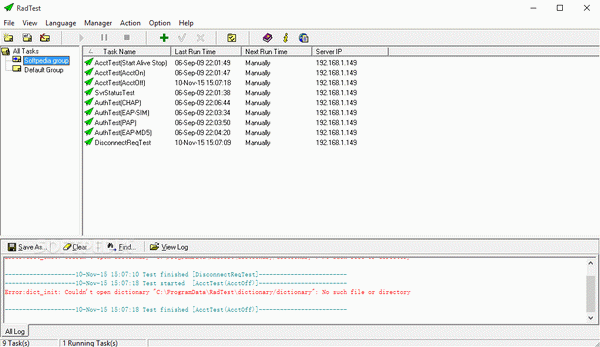Radius Test is a server testing tool that can be used by Internet service providers for dial-in user authentication through RADIUS (Remote Authentication Dial In User Service).
It offers support for EAP MD5, MSCHAPV2, OTP, GTC, TLS, PEAP, TTLS or LEAP, uses multi-threaded replication architecture, and automatically runs tasks via Microsoft Task Scheduler.
The setup package includes RadTest and RadEap Test, and any of them can be excluded from installation. As far as the interface is concerned, the tool adopts a normal window with a plain and simple structure.
A new task can be set up by specifying the name, creator and comments, server details (the IP address, UDP port and shared secret with the authentication server) and others (client IP address, number of re-authentications, timeout in seconds, RADIUS connect info, client MAC address, no MPPE keys expected).
Other task properties focus on the SSID, authentication, EAP method, identity and anonymous identity, password, CA and client certificates, client private key, and password for the private key file. Multiple tasks can be put together.
Radius Test gives you the possibility to edit task properties, as well as to run, stop, delete, duplicate, enable or disable tasks. Log details can be inspected in the bottom part of the screen. When it comes to program settings, you can instruct the utility to autorun at every Windows startup until further notice, or to show a splash screen at launch, and minimize it to the systray.
Radius Test didn't put a strain on the computer's performance in our tests, thanks to the fact that it needed a low amount of CPU and RAM to work properly. No error dialogs popped up and it didn't freeze or crash. Help documentation is available for less experienced users.

Sarah
Baie dankie vir die crack
Reply
Kevin
RadiusTest کے لئے keygen کے لئے شکریہ
Reply
joao vitor
感謝RadiusTest補丁
Reply
sabrina
thanks admin
Reply